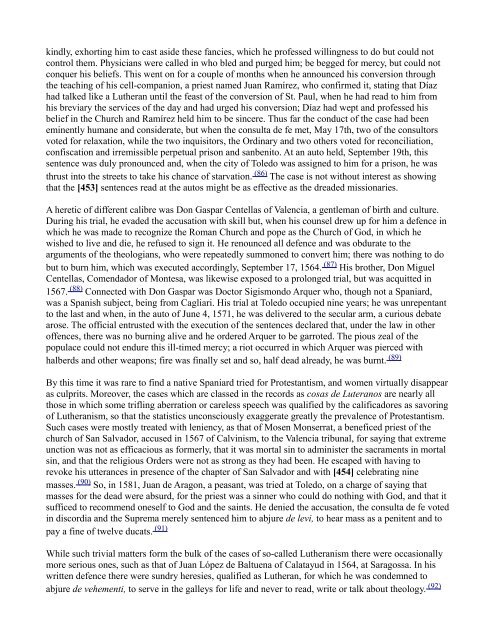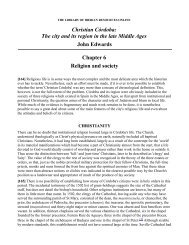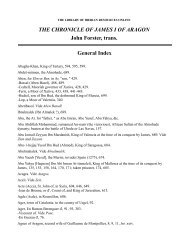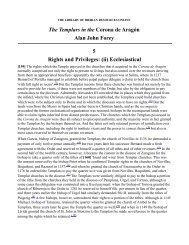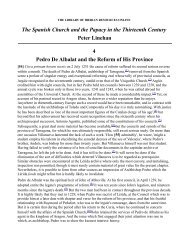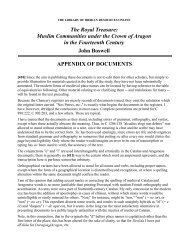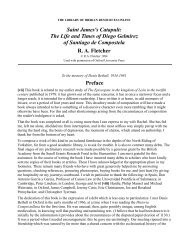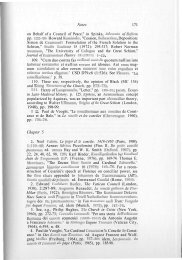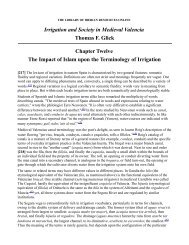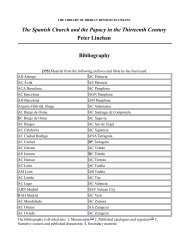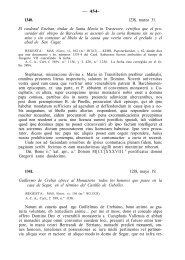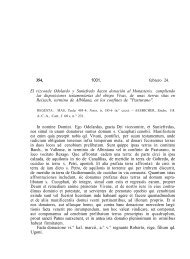PROTESTANTISM - The Library of Iberian Resources Online
PROTESTANTISM - The Library of Iberian Resources Online
PROTESTANTISM - The Library of Iberian Resources Online
You also want an ePaper? Increase the reach of your titles
YUMPU automatically turns print PDFs into web optimized ePapers that Google loves.
kindly, exhorting him to cast aside these fancies, which he pr<strong>of</strong>essed willingness to do but could not<br />
control them. Physicians were called in who bled and purged him; be begged for mercy, but could not<br />
conquer his beliefs. This went on for a couple <strong>of</strong> months when he announced his conversion through<br />
the teaching <strong>of</strong> his cell-companion, a priest named Juan Ramírez, who confirmed it, stating that Díaz<br />
had talked like a Lutheran until the feast <strong>of</strong> the conversion <strong>of</strong> St. Paul, when he had read to him from<br />
his breviary the services <strong>of</strong> the day and had urged his conversion; Díaz had wept and pr<strong>of</strong>essed his<br />
belief in the Church and Ramírez held him to be sincere. Thus far the conduct <strong>of</strong> the case had been<br />
eminently humane and considerate, but when the consulta de fe met, May 17th, two <strong>of</strong> the consultors<br />
voted for relaxation, while the two inquisitors, the Ordinary and two others voted for reconciliation,<br />
confiscation and irremissible perpetual prison and sanbenito. At an auto held, September 19th, this<br />
sentence was duly pronounced and, when the city <strong>of</strong> Toledo was assigned to him for a prison, he was<br />
thrust into the streets to take his chance <strong>of</strong> starvation. (86) <strong>The</strong> case is not without interest as showing<br />
that the [453] sentences read at the autos might be as effective as the dreaded missionaries.<br />
A heretic <strong>of</strong> different calibre was Don Gaspar Centellas <strong>of</strong> Valencia, a gentleman <strong>of</strong> birth and culture.<br />
During his trial, he evaded the accusation with skill but, when his counsel drew up for him a defence in<br />
which he was made to recognize the Roman Church and pope as the Church <strong>of</strong> God, in which he<br />
wished to live and die, he refused to sign it. He renounced all defence and was obdurate to the<br />
arguments <strong>of</strong> the theologians, who were repeatedly summoned to convert him; there was nothing to do<br />
but to burn him, which was executed accordingly, September 17, 1564. (87) His brother, Don Miguel<br />
Centellas, Comendador <strong>of</strong> Montesa, was likewise exposed to a prolonged trial, but was acquitted in<br />
1567. (88) Connected with Don Gaspar was Doctor Sigismondo Arquer who, though not a Spaniard,<br />
was a Spanish subject, being from Cagliari. His trial at Toledo occupied nine years; he was unrepentant<br />
to the last and when, in the auto <strong>of</strong> June 4, 1571, he was delivered to the secular arm, a curious debate<br />
arose. <strong>The</strong> <strong>of</strong>ficial entrusted with the execution <strong>of</strong> the sentences declared that, under the law in other<br />
<strong>of</strong>fences, there was no burning alive and he ordered Arquer to be garroted. <strong>The</strong> pious zeal <strong>of</strong> the<br />
populace could not endure this ill-timed mercy; a riot occurred in which Arquer was pierced with<br />
halberds and other weapons; fire was finally set and so, half dead already, he was burnt. (89)<br />
By this time it was rare to find a native Spaniard tried for Protestantism, and women virtually disappear<br />
as culprits. Moreover, the cases which are classed in the records as cosas de Luteranos are nearly all<br />
those in which some trifling aberration or careless speech was qualified by the calificadores as savoring<br />
<strong>of</strong> Lutheranism, so that the statistics unconsciously exaggerate greatly the prevalence <strong>of</strong> Protestantism.<br />
Such cases were mostly treated with leniency, as that <strong>of</strong> Mosen Monserrat, a beneficed priest <strong>of</strong> the<br />
church <strong>of</strong> San Salvador, accused in 1567 <strong>of</strong> Calvinism, to the Valencia tribunal, for saying that extreme<br />
unction was not as efficacious as formerly, that it was mortal sin to administer the sacraments in mortal<br />
sin, and that the religious Orders were not as strong as they had been. He escaped with having to<br />
revoke his utterances in presence <strong>of</strong> the chapter <strong>of</strong> San Salvador and with [454] celebrating nine<br />
masses. (90) So, in 1581, Juan de Aragon, a peasant, was tried at Toledo, on a charge <strong>of</strong> saying that<br />
masses for the dead were absurd, for the priest was a sinner who could do nothing with God, and that it<br />
sufficed to recommend oneself to God and the saints. He denied the accusation, the consulta de fe voted<br />
in discordia and the Suprema merely sentenced him to abjure de levi, to hear mass as a penitent and to<br />
pay a fine <strong>of</strong> twelve ducats. (91)<br />
While such trivial matters form the bulk <strong>of</strong> the cases <strong>of</strong> so-called Lutheranism there were occasionally<br />
more serious ones, such as that <strong>of</strong> Juan López de Baltuena <strong>of</strong> Calatayud in 1564, at Saragossa. In his<br />
written defence there were sundry heresies, qualified as Lutheran, for which he was condemned to<br />
abjure de vehementi, to serve in the galleys for life and never to read, write or talk about theology. (92)


